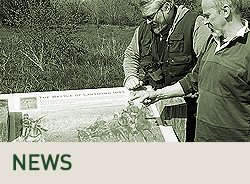Capture
Harcla’s agreement to a truce, rather than taking take the initiative and attacking, has been suggested as being due to his sympathy with Lancaster’s cause. He is seen as giving Lancaster and his supporters the opportunity to slip away in the night and that it was only the arrival of Ward’s troops that forced him to enter the town to take the rebels by force. However his actions are perhaps more likely to have resulted from a wish not to expose his forces to unnecessary danger, and possible defeat, in an opposed assault on the river crossings.
During the night the High Sheriff of Yorkshire, Sir Simon de Ward, from Givendale which is four miles upstream from Boroughbridge, joined Harcla with reinforcements. Very early the next day, the 17th, Harcla entered Boroughbridge, supported by Ward, and called on Lancaster to surrender. There seems to have been no question of organised resistance, because many of the rebel troops had fled during the night. But Lancaster would not surrender, instead taking refuge in Boroughbridge chapel. But Harcla’s men rushed in and took Lancaster prisoner, also capturing his remaining supporters wherever they were founding the town. Though some tried to escape disguised in peasants’ clothes, it is claimed that none of the important figures amongst the rebels managed to escape.
That same day Lancaster was sent by water to York, the other prisoners by road. The king then summoned Pontefract castle which, at the news of their lord’s capture, surrendered. Lancaster was brought to the king there, and on the 22nd March was executed on a hill outside the town. He was then buried in the priory church in Pontefract, where a coffin suggested as being his was found in 1828. Some 30 of his followers were also subsequently executed.





